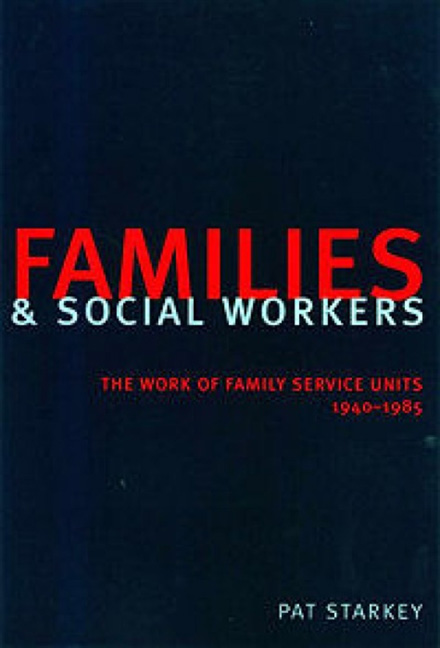Book contents
- Frontmatter
- Contents
- Acronyms and abbreviations
- Introduction
- 1 Pacifist Service
- 2 Problem Families, Eugenics and FSU
- 3 The Growth of a Social Work Agency
- 4 Changes and Adjustments
- 5 Training and Professional Development
- 6 Changing Relationships with the State
- 7 Almost Not An Organisation
- Conclusion
- Bibliography
- Index
Conclusion
- Frontmatter
- Contents
- Acronyms and abbreviations
- Introduction
- 1 Pacifist Service
- 2 Problem Families, Eugenics and FSU
- 3 The Growth of a Social Work Agency
- 4 Changes and Adjustments
- 5 Training and Professional Development
- 6 Changing Relationships with the State
- 7 Almost Not An Organisation
- Conclusion
- Bibliography
- Index
Summary
There can be little doubt that FSU played a significant role in the development of professional social work with families after the Second World War. To quantify the extent of that role is more difficult. It assumes that PSU/FSU workers took with them to new posts the values and methods they had learned in the organisation and were determined to develop and apply them. That may not always have been the case. However, the speed with which units were established with the enthusiastic support of local authorities is testimony to the fact that the organisation was seen to be offering, if not a solution to, then a method of alleviating the problems caused by poverty and deprivation as they affected some families. From the perspective of the early twenty-first century, it is possible to argue that the numbers may have been exaggerated and the appellation ‘problem families’ very loosely and often inappropriately applied, in some cases to large numbers of families whose difficulties evaporated once they had decent housing. However, most urban local authorities perceived a problem that threatened to hinder the work of reconstruction and many were anxious to secure FSU's services in order to solve it. FSU was also invited to give evidence to all major inquiries into social work as it affected the family in the post-war period. It was not alone in that, of course. Evidence was always collected from a wide range of sources, both voluntary and statutory, but that a young and very small organisation should expect to have its voice heard witnesses to the impact it had made in an area which excited official concern.
If measured by its contribution to the development of social work as a subject worthy of academic study, then FSU again scores highly. It found itself at the forefront of the move towards greater profession-alisation of social work after 1945. Its innovatory methods of working with poor and dysfunctional families attracted the attention of teachers in most university social science departments that trained social workers and, even before FSU was properly constituted and certainly before its own workers had received professional training, units in Manchester, Liverpool and Kensington and Paddington were to be found offering practical experience to social work trainees.
- Type
- Chapter
- Information
- Families and Social WorkersThe Work of Family Service Units 1940–1985, pp. 247 - 250Publisher: Liverpool University PressPrint publication year: 2000



